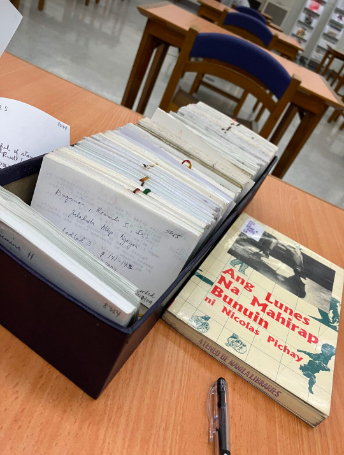Rape
by Ruth Elynia Mabanglo
“I was embarrassed. I found the talk completely offensive. It’s something that was thrust upon me, not for something voluntarily entered into. It was offensive and degrading.” - Anita Hill
Words raped me
Over and over,
Over and over.
Until my spirit tore into shreds.
My memory, big-bellied,
Bearing curses and slurs.
My heart, bruised,
My flesh, battered.
I complained to the dark,
A reproach that wounded the wind’s caress.
I sued the wall,
Trembling voice, rippling terror.
Opinions raped me
Over and over,
Over and over.
Until what’s human perished.
The belly, inflated
With the scourge of voices.
The skull, fractured
From the public flogging.
I complained to the law,
It noted my looks, drew attention to my physique.
I filed my suit at city hall,
was studied, scolded, for my name, my sex.
The decision raped me,
Once,
Just once.
Reducing all hope to rubble.
Translating Ruth Elynia Mabanglo's poem, "Gahasa" (1992) into English made me think about how different discourse communities talk about rape. Mabanglo's poem, which references, in its epigraph, the controversy involving American lawyer Anita Hill (who had testified that a nominee to the US Supreme Court had sexually harassed her while she was employed as his assistant), describes the far-reaching effect of unwanted sexual contact from the vantage point of victims. They suffer, not just from the original violation of their human dignity and agency, but from being the object of rumors and public criticism, and from being treated harshly rather than sympathetically, by a justice system that is more concerned about treating the perpetrators "justly" rather than securing the justice the victims seek.
In a recent decision (People vs. Agao, G.R. No. 248049 [2023]), the Supreme Court insisted on defining consummated rape in terms of the penetration of sexual organs--a stance that Associate Justice Marvic Leonen has correctly described as favorable to the perpetrators (its primary aim being to distinguish consummated rape from attempted rape, which carries a lower penalty). But to a victim, rape is rape. "To further discuss which part of her
vagina was violated serves no other purpose than as a platform to determine
how this Court can lessen her rapist's punishment," Leonen wrote in his dissent.
The majority decision took pains to note that it was constrained to talk about rape in anatomical terms because that was how current black letter law defined the crime. But, this is a conservative stance, one that fails to properly acknowledge other judicial interpretations of rape that exist and define the crime in more progressive terms--that is, under terms that consider the crime from the vantage point of the victim.
In People v. Quintos (G.R. No. 199402 [2014]), the Supreme Court had already ruled that "A person commits rape when he sexually assaults another who does not consent or is incapable of giving consent to a sexual act." People v. Quintos interprets black letter law in a manner that allows the Philippine State to comply with its obligation under the Convention on the Elimination of Discrimination Against Women (CEDAW), particularly the obligation to "modify
or abolish existing laws, regulations, customs and practices which constitute
discrimination against women" (CEDAW art. 2(f)).
Just as the Court had previously issued the interpretation that there can be no such thing as frustrated rape (People v. Orita, 88724 [1990]), it could have ruled that there is no such thing as attempted rape--especially since rape has been reclassified by legislature as a crime against persons (instead of a crime against honor) and--following the Philippines' ratification of, and assumption of obligations under CEDAW--the Court itself had already declared the lack of consent of a sexual act as the main element of rape. It is unfortunate that the Supreme Court has taken a step back in People v. Agao.
*
Translating "Gahasa" also made me realize something about the decision I made years ago to study and practice law. What attracted me to the law was its rational, orderly language, which I mistook for wisdom. If I learned its language, I might have a better hold on my emotions, and all of life's disorderly bits. Perhaps the law's language could help me (not only vindicate, but) transcend the personal injuries and hurts one (or one's client) has sustained as a result of (what one considered) injustice.
I realize now that I was mistaken. The law speaks the way it does to preserve order. Whether or not you will be hurt further by it (its logic, its reasonableness, its imposition of order) depends on which side of that order you inhabit.


